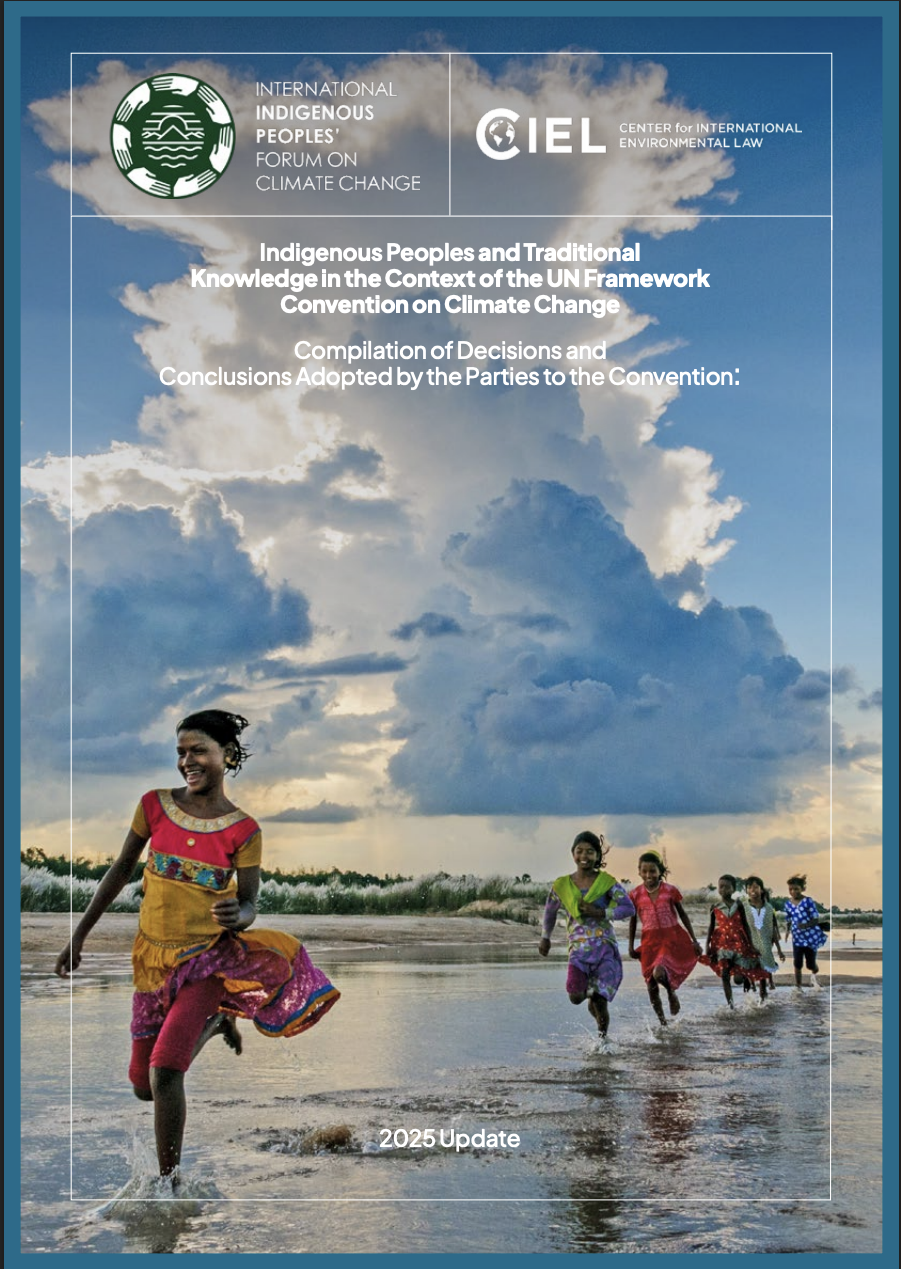Indigenous Peoples and Traditional Knowledge in the Context of the UNFCCC (November 2025) – Center for International Environmental Law | CIEL

Report on the Integration of Indigenous Knowledge in Climate Policy and its Contribution to the Sustainable Development Goals
Introduction: Aligning Climate Action (SDG 13) with Indigenous Knowledge
For decades, Indigenous Peoples have utilized traditional knowledge systems to understand and respond to the climate crisis. This unique understanding, derived from a deep connection to the natural world, is a critical component of effective and rights-based climate action, directly supporting the objectives of SDG 13 (Climate Action). The leadership of Indigenous Peoples has been instrumental in shaping international climate policy, as acknowledged in the preamble of the Paris Agreement and within ongoing UNFCCC negotiations.
Promoting Equality and Justice in Climate Resilience (SDG 10 & SDG 16)
The meaningful participation of Indigenous Peoples is recognized as essential for strengthening climate-resilient development and achieving socially just solutions. This approach is fundamental to reducing inequalities and ensuring fair outcomes in the global response to climate change.
- IPCC Recognition: The Intergovernmental Panel on Climate Change (IPCC) affirms that including Indigenous Peoples promotes locally appropriate solutions, a key aspect of SDG 10 (Reduced Inequalities).
- International Legal Rulings: Recent decisions by the International Court of Justice and the Inter-American Court of Human Rights have reaffirmed the obligations of States to protect Indigenous rights within climate policy.
- Upholding Rights: These obligations include the principle of Free, Prior, and Informed Consent (FPIC), which is crucial for building the inclusive and just institutions targeted by SDG 16 (Peace, Justice and Strong Institutions).
A Key Resource for Policy and Partnership (SDG 17)
In a collaborative effort reflecting SDG 17 (Partnerships for the Goals), the Center for International Environmental Law (CIEL) and the International Indigenous Peoples Forum on Climate Change have produced a comprehensive resource. The document, titled Indigenous Peoples and Traditional Knowledge in the Context of the UN Framework Convention on Climate Change, serves as a vital tool for all stakeholders engaged in climate action.
- Purpose: The compilation lists all references to Indigenous Peoples and traditional knowledge adopted by UNFCCC bodies up to COP30.
- Audience: It is designed to assist governments, private corporations, and financial institutions in developing informed and equitable climate policies.
- Continuity: This report complements previous compilations published in 2018, 2019, and 2021, demonstrating a sustained partnership and commitment to these goals.
Analysis of the Article in Relation to Sustainable Development Goals
1. Which SDGs are addressed or connected to the issues highlighted in the article?
-
SDG 13: Climate Action
This is the central theme of the article. The text explicitly discusses the “climate crisis,” “climate change,” and “climate action.” It references key international climate frameworks like the “Paris Agreement” and “UNFCCC negotiations,” which are the primary mechanisms for achieving SDG 13.
-
SDG 10: Reduced Inequalities
The article focuses on “Indigenous Peoples,” a group often marginalized in policy-making. It advocates for their “meaningful participation” and the protection of their rights, which directly addresses the goal of reducing inequalities and promoting the social and political inclusion of all.
-
SDG 16: Peace, Justice and Strong Institutions
The article emphasizes a “rights-based climate action” approach. It refers to rulings from the “International Court of Justice” and the “Inter-American Court of Human Rights” that reaffirm “States’ obligations to protect Indigenous rights.” This connects to building effective, accountable, and inclusive institutions and ensuring access to justice.
2. What specific targets under those SDGs can be identified based on the article’s content?
-
Under SDG 13 (Climate Action):
- Target 13.2: Integrate climate change measures into national policies, strategies and planning. The article’s discussion of the “Paris Agreement,” “UNFCCC negotiations,” and the need for rights-based “climate policy” directly relates to this target.
- Target 13.b: Promote mechanisms for raising capacity for effective climate change-related planning and management… including focusing on… local and marginalized communities. The focus on “Indigenous Peoples” and their “unique knowledge systems” as a resource for climate response aligns with building capacity within marginalized communities.
-
Under SDG 10 (Reduced Inequalities):
- Target 10.2: By 2030, empower and promote the social, economic and political inclusion of all… The article’s call for “meaningful participation of Indigenous Peoples” in climate policy is a direct reflection of this target.
- Target 10.3: Ensure equal opportunity and reduce inequalities of outcome, including by eliminating discriminatory… policies and practices… The article highlights court rulings that reaffirm the obligation to protect Indigenous rights, including “Free, Prior, and Informed Consent (FPIC),” which is a mechanism to ensure equal opportunity and prevent discriminatory outcomes in climate projects.
-
Under SDG 16 (Peace, Justice and Strong Institutions):
- Target 16.7: Ensure responsive, inclusive, participatory and representative decision-making at all levels. The emphasis on “meaningful participation of Indigenous Peoples” and the principle of “FPIC” are core components of inclusive and participatory decision-making.
3. Are there any indicators mentioned or implied in the article that can be used to measure progress towards the identified targets?
-
For SDG Target 13.2:
- Implied Indicator: The number and substance of references to Indigenous Peoples and traditional knowledge in official climate policy documents. The article highlights a compilation that “lists all of the references to Indigenous Peoples and traditional knowledge adopted by the UNFCCC bodies,” suggesting that tracking these references is a way to measure integration.
-
For SDG Targets 10.3 and 16.7:
- Mentioned Indicator: The adoption and implementation of legal frameworks requiring Free, Prior, and Informed Consent (FPIC). The article explicitly names “Free, Prior, and Informed Consent (FPIC)” as a right that States are obligated to protect in climate policy. Progress can be measured by the extent to which this principle is enshrined in law and practice.
-
For SDG Targets 10.2 and 16.7:
- Implied Indicator: The level of participation of Indigenous Peoples in climate negotiations and policy-making bodies. The call for “meaningful participation” implies that progress can be measured by the presence and influence of Indigenous representatives in forums like the UNFCCC and in national climate action planning.
Summary Table of SDGs, Targets, and Indicators
| SDGs | Targets | Indicators (Mentioned or Implied in the Article) |
|---|---|---|
| SDG 13: Climate Action | 13.2: Integrate climate change measures into national policies, strategies and planning. 13.b: Promote mechanisms for raising capacity for effective climate change-related planning and management… including focusing on… local and marginalized communities. |
Number of references to Indigenous Peoples and traditional knowledge in UNFCCC and national climate policy documents. |
| SDG 10: Reduced Inequalities | 10.2: Empower and promote the social, economic and political inclusion of all. 10.3: Ensure equal opportunity and reduce inequalities of outcome. |
Level of participation of Indigenous Peoples in climate policy-making bodies. Adoption and implementation of legal frameworks requiring Free, Prior, and Informed Consent (FPIC). |
| SDG 16: Peace, Justice and Strong Institutions | 16.7: Ensure responsive, inclusive, participatory and representative decision-making at all levels. | Existence of policies and mechanisms that ensure the “meaningful participation” of Indigenous Peoples in climate-related decisions. |
Source: ciel.org
What is Your Reaction?
 Like
0
Like
0
 Dislike
0
Dislike
0
 Love
0
Love
0
 Funny
0
Funny
0
 Angry
0
Angry
0
 Sad
0
Sad
0
 Wow
0
Wow
0















































































